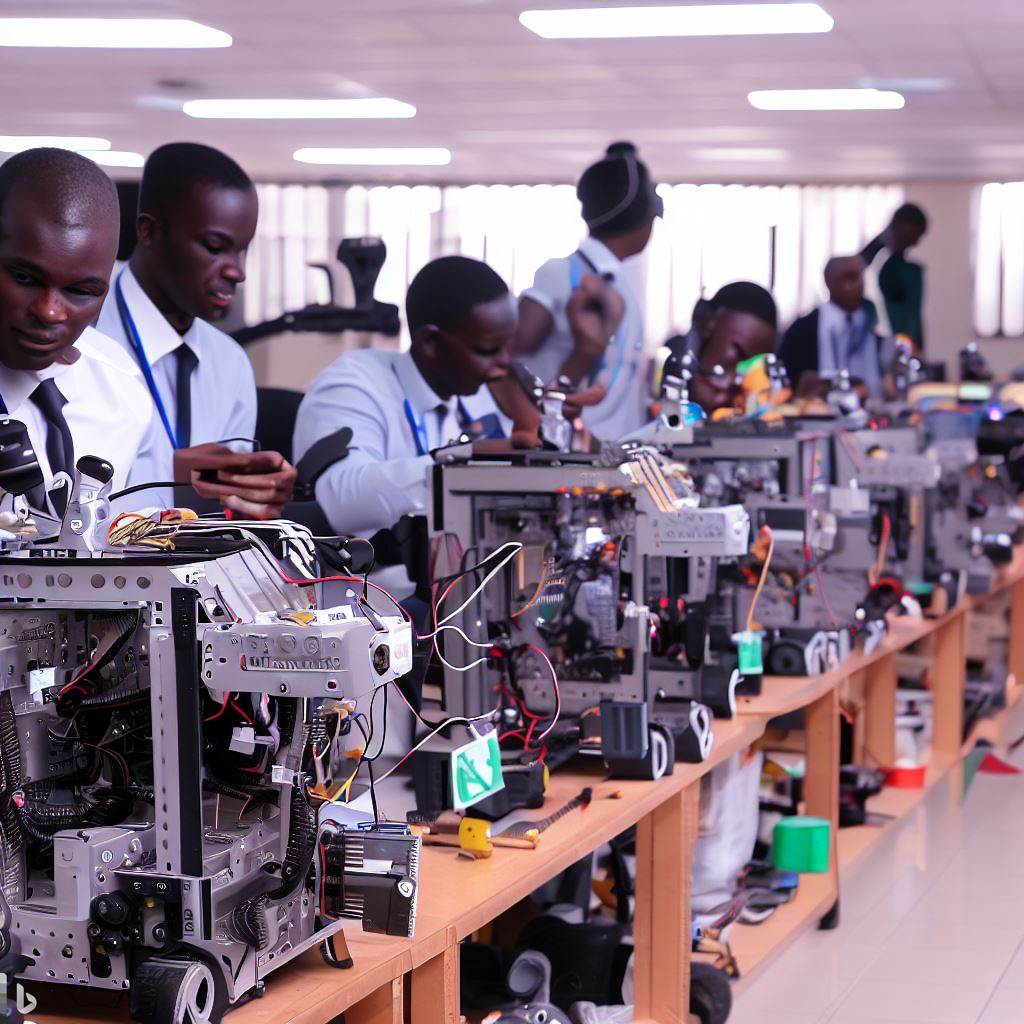Career Tips
Nigerian Universities Offering Robotics Engineering

The area of robotics engineering is rapidly expanding on a global basis. With advances in technology and automation, the demand for qualified professionals in this industry is increasing. Robotics engineering is the process of designing, building, and operating robots to fulfill a variety of activities and functions.
In Nigeria, there is an increasing interest in technology developments and innovation. The country recognizes the need of embracing innovative technology to promote economic growth and development. Robotics engineering programs have become critical in preparing Nigerian students to meet the demands of the future labor market.
Robotics engineering programs in Nigeria aim to give students a good foundation in mathematics, computer programming, electronics, and mechatronics. These programs seek to develop critical thinking, problem-solving, and innovative skills.
Universities in Nigeria are helping to improve technological knowledge by offering robotics engineering degrees.
Importance of robotics engineering programs in the country
- Robotics engineering programs in Nigeria have the potential to boost the country’s economy by encouraging entrepreneurship and technical innovation.
- Graduates of these schools have the potential to become industry pioneers, providing career opportunities and pushing technological improvements in a variety of fields.
- In short, the discipline of robotics engineering is rapidly expanding around the world, and Nigeria understands its importance in technological advancement.
- Nigerian universities are preparing students to become trained professionals capable of fulfilling tomorrow’s demands by offering robotics engineering courses.
- This dedication to technical advancement positions Nigeria for a bright and innovative future.
Overview of Robotics Engineering
Definition and Scope of Robotics Engineering
Robotics engineering is the multidimensional field of designing, building, and programming robotic devices, combining parts of mechanical and electrical engineering, computer science, and artificial intelligence.
Significance of Robotics across Diverse Industries
- The resonance of robotics reverberates profoundly throughout an array of industries, spanning manufacturing, healthcare, agriculture, and even celestial exploration.
- With adept precision, robots undertake repetitive tasks, navigate perilous environments, and elevate overall efficiency.
- From surgical assistance to assembly line automation and venturing into unreachable domains, their impact is transformative.
Skills and knowledge required to excel in the field
- Mastery in robotics engineering requires a combination of technical expertise and cognitive intelligence.
- The foundation is built on a solid understanding of mechanical systems, programming languages, and sensor technologies.
- These essentials are augmented by the critical qualities of imaginative problem-solving, unbridled imagination, and a solid foundation in mathematics and physics.
- Staying current with technological improvements, combined with effective communication and a collaborative mindset, completes the overall skill set.
- Furthermore, prestigious colleges in Nigeria have dedicated robotics engineering programs.
- These include a comprehensive curriculum aimed to promote a thorough understanding of the complexities of robotics engineering, as well as the visionaries who will influence the field’s future.
Current State of Robotics Engineering in Nigeria
The limited availability of robotics engineering programs in the country
- The lack of specialized university programs in robotics engineering in Nigeria restricts its progress.
- Despite the country’s tremendous potential and population, only a few universities offer courses in robotics engineering.
- This deficiency has serious implications for both skill development and technological advancement.
- The present lack in robotics engineering education drives aspiring students to pursue studies abroad, resulting in a significant brain drain.
The need to establish more universities offering robotics engineering
- Due to the high demand for robotics experts, Nigeria needs more colleges that offer robotics engineering programs.
- By expanding the availability of such programs, the country can instill a desire for innovation in pupils.
- This growth will encourage a domestic talent pool, reducing reliance on foreign expertise.
The introduction of new robotics engineering courses would serve a dual purpose
- Creating job opportunities for Nigerian students and advancing the country’s technological prowess.
- Government assistance and money should be directed toward colleges that wish to offer robotics engineering programs.
- Collaborative endeavors with internationally recognized robotics research institutions can enable the development of high-quality courses in Nigeria.
- Furthermore, establishing collaborations between academics and industry will make these programs more relevant to contemporary industry needs.
- This collaboration will provide graduates with practical skills, allowing them to influence technical progress in the real world.
- In summary, Nigeria is at a crossroads where the expansion of robotics engineering programs is critical to realizing the full potential of this subject.
- Nigeria can close the current skill gap, stimulate innovation, and make a substantial contribution to the global technological scene by developing robotics engineering universities.
Universities Offering Robotics Engineering in Nigeria
Nigeria has a number of prestigious universities offering complete robotics engineering programs, each catering to budding engineers with unique entry requirements, curricula, and experiential learning possibilities.
List of universities in Nigeria offering robotics engineering programs
- Federal University of Technology, Akure
- University of Lagos
- Ahmadu Bello University, Zaria
- University of Nigeria, Nsukka
- Rivers State University
- Covenant University, Ota
- Nnamdi Azikiwe University, Awka
- Obafemi Awolowo University, Ile-Ife
- Federal University of Technology, Owerri
- University of Benin
Admission requirements for each university
Federal University of Technology, Akure
- Minimum of five O’Level credits, including Mathematics and English.
- JAMB UTME score: 180 or higher.
- Post-UTME assessment.
University of Lagos
- Five O’Level credits, including Mathematics and English.
- JAMB UTME score: ≥200.
- Post-UTME evaluation.
Ahmadu Bello University, Zaria
- Five O’Level credits, including Mathematics and English.
- JAMB UTME score: ≥180.
- Direct Entry: Diploma/NCE in pertinent fields.
University of Nigeria, Nsukka
- Five O’Level credits, including Mathematics and English.
- JAMB UTME score: ≥200.
- Post-UTME appraisal.
Rivers State University
- Five O’Level credits, including Mathematics and English.
- JAMB UTME score: ≥180.
- Post-UTME assessment.
Covenant University, Ota
- Five O’Level credits, including Mathematics and English.
- JAMB UTME score: ≥200.
- Post-UTME screening.
- Covenant University Scholastic Aptitude Screening (CUSAS) involvement.
Nnamdi Azikiwe University, Awka
- Five O’Level credits, including Mathematics and English.
- JAMB UTME score: ≥180.
- Post-UTME appraisal.
Obafemi Awolowo University, Ile-Ife
- Five O’Level credits, including Mathematics and English.
- JAMB UTME score: ≥200.
- Post-UTME evaluation.
Federal University of Technology, Owerri
- Five O’Level credits, including Mathematics and English.
- JAMB UTME score: ≥180.
- Post-UTME assessment.
University of Benin
- Five O’Level credits, including Mathematics and English.
- JAMB UTME score: ≥200.
- Post-UTME evaluation.
Provide an overview of the curriculum and coursework offered in these programs
- The robotics engineering program at Nigerian universities includes a variety of topics.
- Mathematics, physics, computer programming, electronics, control systems, artificial intelligence, robotic design, and mechatronics are all core topics.
- Lab sessions, internships, and projects provide hands-on experience, developing problem-solving, critical thinking, creativity, and hands-on robotics construction and programming skills.
- This comprehensive curriculum provides graduates with advanced abilities in robot design, system automation, and integration, preparing them for careers in enterprises, research organizations, and academia.
Benefits of Pursuing Robotics Engineering in Nigeria
Career Prospects and Opportunities in Robotics Engineering
- The field of robotics engineering in Nigeria offers a wide range of exciting job prospects.
- Graduates of this discipline are sought for assets in industries ranging from manufacturing to automation.
- The high need for competent robotics engineers in Nigeria creates a plethora of work opportunities.
- These professionals contribute to ground-breaking research and development, resulting in cutting-edge innovations that influence industries.
- A career in robotics engineering provides not only specific abilities, but also exciting opportunities for professional development.
Potential for innovation and technological advancements in Nigeria
- The forefront of robotics engineering has the ability to drive Nigeria into a world of unmatched creativity and innovation.
- By leading the development of advanced robotics systems, Nigeria promotes itself as a global technology challenger.
- This influence spreads to several industries such as healthcare, agriculture, and transportation, accelerating their growth rates.
- Nigeria fosters robotics engineering, creating a magnetism for innovation and attracting key investments.
- The resulting technology advancements promise increased efficiency and productivity, catapulting industry to new heights.
Importance of robotics engineering for economic growth and development
- Robotics engineering is essential to Nigeria’s economic evolution, serving as a critical driver for growth and development.
- The introduction of robotics technology increases industrial output rates, aligning with market demands.
- Excellent automation, carefully managed through robotics engineering, results in cost reduction and waste minimization, which increases profitability.
- The deployment of robotics technology is the foundation of a more competitive Nigerian economy.
- A shining display of robotics proficiency entices global investment, enhancing Nigeria’s rise as a technological leader.
Universities Offering Robotics Engineering in Nigeria
- Several Nigerian universities serve as shining examples of robotics engineering education.
- These academic institutions provide an ideal environment for budding robotics engineers to gain extensive information and abilities.
- Investing in robotics engineering in Nigeria promises a rich tapestry of benefits for both people and the country as a whole.
- Graduates embark on a journey filled with diverse employment opportunities in fields such as manufacturing and robotics.
- The dynamic field’s ability to foster innovation, promote technology, and revitalize Nigeria’s economic environment is nothing short of remarkable.
- Nigeria’s rise to technological excellence is dependent on emphasizing the critical role of robotics engineering, which is aided by prudent investments in education and research.
Challenges and Solutions in Robotics Engineering Education
Challenges Confronting Universities Offering Robotics Engineering in Nigeria
The progress of robotics engineering programs in Nigerian universities is impeded by multifaceted challenges:
- Resource Constraints: Insufficient funding hampers the establishment and maintenance of robotics labs, hindering practical learning.
- Faculty Shortage: The scarcity of qualified instructors proficient in robotics engineering limits effective teaching.
- Technology Gap: The absence of state-of-the-art equipment impedes hands-on experience and technological exposure.
- Industry Estrangement: Limited industry interaction deprives students of valuable practical training and real-world insights.
- Outdated Curriculum: Curricula misaligned with industry trends and technological evolution fail to equip students adequately.
- Enrollment and Awareness: The underrepresentation of robotics engineering awareness leads to low enrollment and limited opportunities.
- Research Insufficiency: Inadequate research initiatives hinder innovation and the field’s progression.
- Foreign Competition: The allure of foreign institutions with advanced robotics programs intensifies competition.
Resolving Challenges Through Strategic Collaborations and Government Support
Elevating robotics engineering education necessitates concerted efforts:
- Industry Partnerships: Forge symbiotic ties with industries through funding for labs, internships, and joint research projects.
- Government Backing: Governmental involvement via funding, grants, and policies can catalyze infrastructure and expertise enhancement.
- Curricular Advancement: Engage industry experts for curriculum enhancement, integrating practical training and emerging disciplines.
- Infrastructure Upgrade: Modernize infrastructure with cutting-edge robotics labs and technology, ensuring regular upkeep.
- Heightened Awareness: Organize workshops, competitions, and awareness campaigns to foster interest in robotics engineering.
- Research Catalysts: Establish research centers, provide grants, and foster academia-industry synergy for impactful research.
Finally, Nigerian universities may overcome robotics engineering education obstacles by cultivating industry partnerships, getting government funding, enriching curricula, improving infrastructure, raising awareness, and nurturing research.
Such concentrated efforts have the potential to alter robotics engineering education and produce skilled graduates ready to drive the field’s growth.
Success Stories and Achievements in Robotics Engineering in Nigeria
Showcasing Innovation in Robotics Engineering
In the field of Nigerian robotics engineering, great progress has been made, as evidenced by unique initiatives that highlight the capabilities of indigenous people.
- AutoTracker: Employing real-time tracking, this robotic marvel monitors vehicles, proving invaluable for crime prevention and vehicle surveillance in various Nigerian cities.
- AgriBot: The agricultural sector reaps benefits from AgriBot, revolutionizing planting, harvesting, and crop growth monitoring. Increased productivity and improved yields are witnessed across the nation.
- MediBot: Advancing surgical precision, the MediBot finds a pivotal role in hospitals. Its minimally invasive procedures and elevated success rates mark a significant leap in medical technology.
- SmartGuard: Melding robotics and security, the SmartGuard’s facial recognition capabilities elevate surveillance, fortifying safety measures across the nation.
- EduBot: Schools embrace EduBot, an educational aid imparting programming and engineering concepts, nurturing the next generation of robotics enthusiasts.
Triumphs of Nigerian Robotics Engineers on a Global Stage
Innovation has no bounds, and Nigerian robotics engineers are living proof of this, having received national and worldwide recognition.
- Dr. Adeola Akinsanya: Her affordable robotic limb solution resonates globally, offering assistance to individuals with limb disabilities.
- Engr. Ibrahim Yakubu: A three-time winner of the Nigerian National Robotics Competition, his prowess elevates Nigeria’s standing in the global robotics arena.
- Nkechi Nwosu: Securing a gold medal at the International Robotics Olympiad, Nwosu exemplifies Nigeria’s untapped potential in the field.
- Dr. Chinedu Amadi: Renowned for swarm robotics research, his insights resonate on the global stage, spotlighting Nigeria’s contributions to cutting-edge advancements.
- Engr. Fatima Ahmad: The National Science and Technology Award underscores her groundbreaking innovation, a testament to Nigeria’s ability to drive positive societal change through robotics.
These triumphs reflect the potential of Nigerian robotics engineering and underscore the capabilities of local engineers.
As the nation paves the way for future innovations, numerous universities offering robotics engineering in Nigeria play a pivotal role in nurturing talent, ensuring a promising trajectory for the field.
Conclusion
Universities that teach robotics engineering in Nigeria are quite important. They provide specialized education and training in this subject, which is critical to the country’s technical progress and innovation.
I recommend students to seek a profession in robotics engineering since it provides many options for growth and success. The demand for qualified individuals in this industry is growing worldwide, and Nigeria is no exception.
Furthermore, Nigeria has a strong potential to become a hub for robotics and technological innovation. With appropriate investment and assistance, the country can attract brilliant individuals and businesses, stimulating innovation and driving economic progress.
Nigeria is making a significant step toward becoming a technologically advanced nation by establishing colleges that provide robotics engineering programs. It opens the way for the creation of cutting-edge technologies, automation, and artificial intelligence, propelling advancement in a variety of industries including healthcare, manufacturing, and agriculture.
The importance of robotics engineering cannot be emphasized, and students should take advantage of this opportunity to shape Nigeria’s technological landscape. With the correct skills and knowledge, individuals can help shape the country’s future, propelling Nigeria to the forefront of robotics and technological breakthroughs worldwide.












